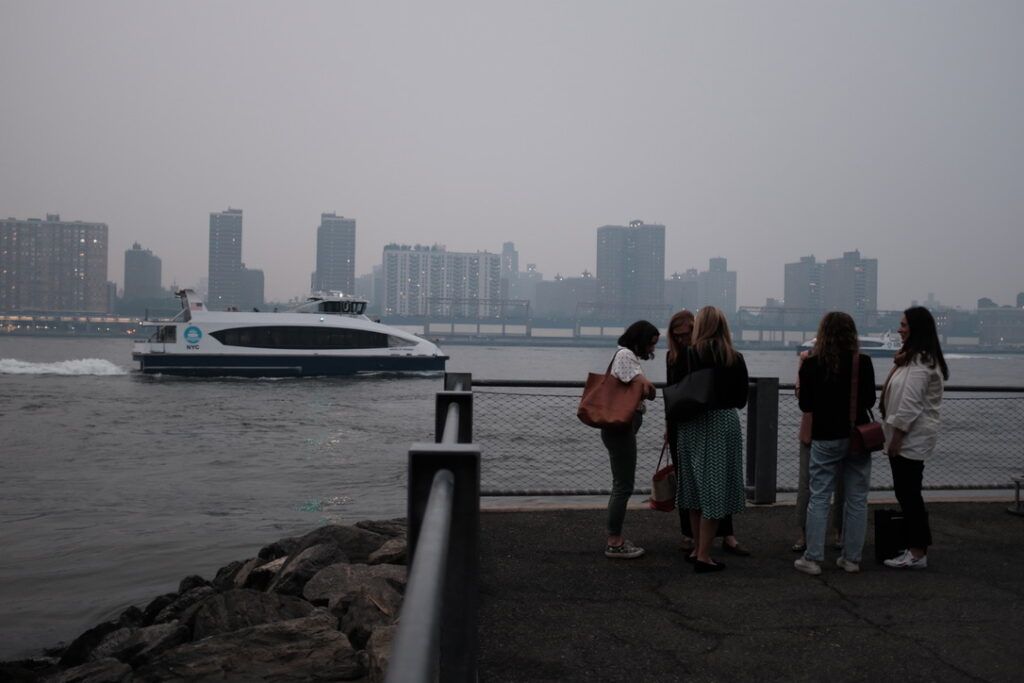Don’t call toxic wildfire smoke on the East Coast the ‘new normal’
By Jessica McKenzie | July 7, 2023
 Smoky skies in New York City in early June. (Photo: Jessica McKenzie)
Smoky skies in New York City in early June. (Photo: Jessica McKenzie)
A haze of wildfire smoke drifting down from Canada blanketed the Catskill Mountains in the days leading up to the recent holiday weekend. The air quality levels displayed in my weather app hovered between 100 and 200 on the US air quality index—not as bad as it had been a month before, but still unhealthy, especially for sensitive groups. Although my friends and I had come up for a long weekend in the fresh country air, we kept the doors shut and the windows closed tight, venturing out only for short periods until a front blew most of the smoke away.
Expect more days like those, New York Governor Kathy Hochul warned.
“There is no end in sight,” Hochul said on June 29. “This is the new normal for New Yorkers.”
While Hochul may not be wrong, her language betrays a troublingly blasé attitude about a serious decline in environmental conditions on the East Coast. Last month the United States experienced the worst day of wildfire smoke pollution—as measured by the level of small particulate matter the average American was exposed to—since 2006, when tracking began.
“It’s the worst by far, I mean, Jesus, it was bad,” Marshall Burke, an environmental scientist at Stanford University who spearheaded that data analysis, told The Guardian. “It’s hard to believe to be honest, we had to quadruple check it to see if it was right. We have not seen events like this, or even close to this, on the East Coast before. This is a historic event.”
But just a few weeks later, poor air quality was already old news to some. “Expect a hot, smoky summer in much of America. Here’s why you’d better get used to it,” an Associated Press headline blared.
Again, the facts may not be wrong, but to see the coverage of and discussion about wildfire smoke on the East Coast evolve from “historic event” to “get used to it” in the span of a month is enough to give anyone whiplash. It feels like shifting baseline syndrome had occurred—overnight.
Shifting baseline syndrome has been defined as the “psychological and sociological phenomenon whereby each new human generation accepts as natural or normal the situation in which it was raised,” including environmental or climactic conditions. Obviously, that generational shift can’t occur in just a few weeks. But it’s still alarming to see how quickly public officials, journalists, and other significant figures have come around to this “new normal.”
There is a danger to this type of premature normalization. If such language goes too far—to a “new normal” from which there is no return—then the energy, excitement, and money that could be focused on climate action might dry up or be diverted to adaptation alone. Hochul’s lengthy statement warning New Yorkers about the risks of poor air quality last week made no mention of a climate crisis, fossil fuels, or greenhouse gases. And if this is the new normal, then people might start to think there’s nothing to be done except get used to it.
Scientists have pushed against this rhetoric, perhaps in an attempt to prevent that kind of stagnation and paralysis. “Is this a new normal? No, it’s a new abnormal,” University of Pennsylvania climate scientist Michael Mann told the Associated Press. “It continues to get worse. If we continue to warm the planet, we don’t settle into some new state. It’s an ever-moving baseline of worse and worse.”
“Some people like to say this is the new normal,” Michael Flannigan, a lead fire researcher at Thompson Rivers University, told Heatmap News. “I really do not like that term. Normal suggests a steady state. We’re not in a steady state. We’re in a downward spiral in Dante’s circle of hell.”
Together, we make the world safer.
The Bulletin elevates expert voices above the noise. But as an independent nonprofit organization, our operations depend on the support of readers like you. Help us continue to deliver quality journalism that holds leaders accountable. Your support of our work at any level is important. In return, we promise our coverage will be understandable, influential, vigilant, solution-oriented, and fair-minded. Together we can make a difference.
Keywords: air quality, climate crisis, smoke, wildfire
Topics: Climate Change














